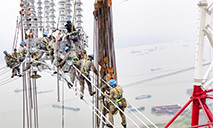Commentary: West's double-standard coverage of Russia-Ukraine conflict hypocritical, deplorable
CAIRO, March 18 (Xinhua) -- If people take a close look at the Western coverage on the ongoing Russia-Ukraine conflict, they can easily see racial prejudice and double standards -- practices that Western media have often scoffed at.
"These are not refugees from Syria, these are refugees from Ukraine ... They're Christian, they're white, they're very similar (to us)," Kelly Cobiella, an NBC News correspondent based in London, recently said on video.
Since the onset of the conflict, such remarks of a racist nature have been circulating on Western media.
When numerous journalists have focused on the look, skin color, race and religion of Ukranian evacuees, and made a comparison between them and refugees from the Middle East and North Africa, their unspoken implication is that the former are superior to the latter and have less reason to suffer from any plight.
Behind the double-standard coverage is the condescending mindset and the penetration of Western-centrism in their journalism industry, which views the Western countries "more civilized" than the rest of the world.
Obsessed with preaching others on human rights and civil rights, and chanting such slogans as "all men are created equal," the United States and its allies, however, have long been holding double standards and racist bias.
A basic rule of journalism is to be sensitive to victims' feeling when reporting on any tragedy, but in fact, some in the West just associate the need of comfort to people's race.
As Andrew Mitrovica, an Al Jazeera columnist who had previously worked at several Western news organizations, has criticized, "editorial staff shaped institution-wide editorial policies that, in effect, established who and what kind of 'victims' warrant sympathy and attention and who and what kind of 'victims' do not."
"While the invasion of Iraq by the United States was considered a liberation, the operation taken by Russia is seen as a cut-throat invasion in the eyes of the Western media," Egyptian professor and writer Azza Radwan Sedky wrote in an article published on Ahram Online, the English news website of Egypt's Al-Ahram newspaper.
Moreover, while the Russia-Ukraine conflict is under the spotlight, the sufferings of people in such countries as Iraq and Afghanistan, both invaded by the United States, are receiving less coverage by Western media.
Joy Reid, an MSNBC political analyst and host, criticized the Western coverage of Ukraine, saying Americans only care about the war because Ukrainians are "white and largely Christian."
"We should also care this much for refugees and those facing occupation and war in the Middle East and Asia and Africa, too," Reid said. "But we haven't witnessed the same type of solidarity for the Yemenis as we do for the Ukranians."
Obviously, Western media have been posting contradictory narratives on similar situations, with the difference hinging on their own interest and calculation, rather than professional ethics or responsibilities. That's why they have called the U.S.-launched wars in Iraq and Afghanistan as "a liberation" and an "anti-terror" fight.
Facing a conflict, media outlets are expected to play a role in bridging understanding gaps and promoting peace, in addition to providing information and documenting what is going on.
Unfortunately, some Western media's deeds have run counter to these aims, which only tarnished their reputation and credibility, and exposed their hypocrisy and racist bias.
Photos
Related Stories
- Zelensky urges Germany to provide more support
- Facts about Russia-Ukraine conflict: Erdogan renews proposal to bring Putin, Zelensky together
- U.S., NATO hold key to solving Ukraine crisis: FM spokesperson
- Putin, Erdogan discuss Russia-Turkey ties, Ukraine
- Erdogan renews proposal to bring Putin, Zelensky together
Copyright © 2022 People's Daily Online. All Rights Reserved.










